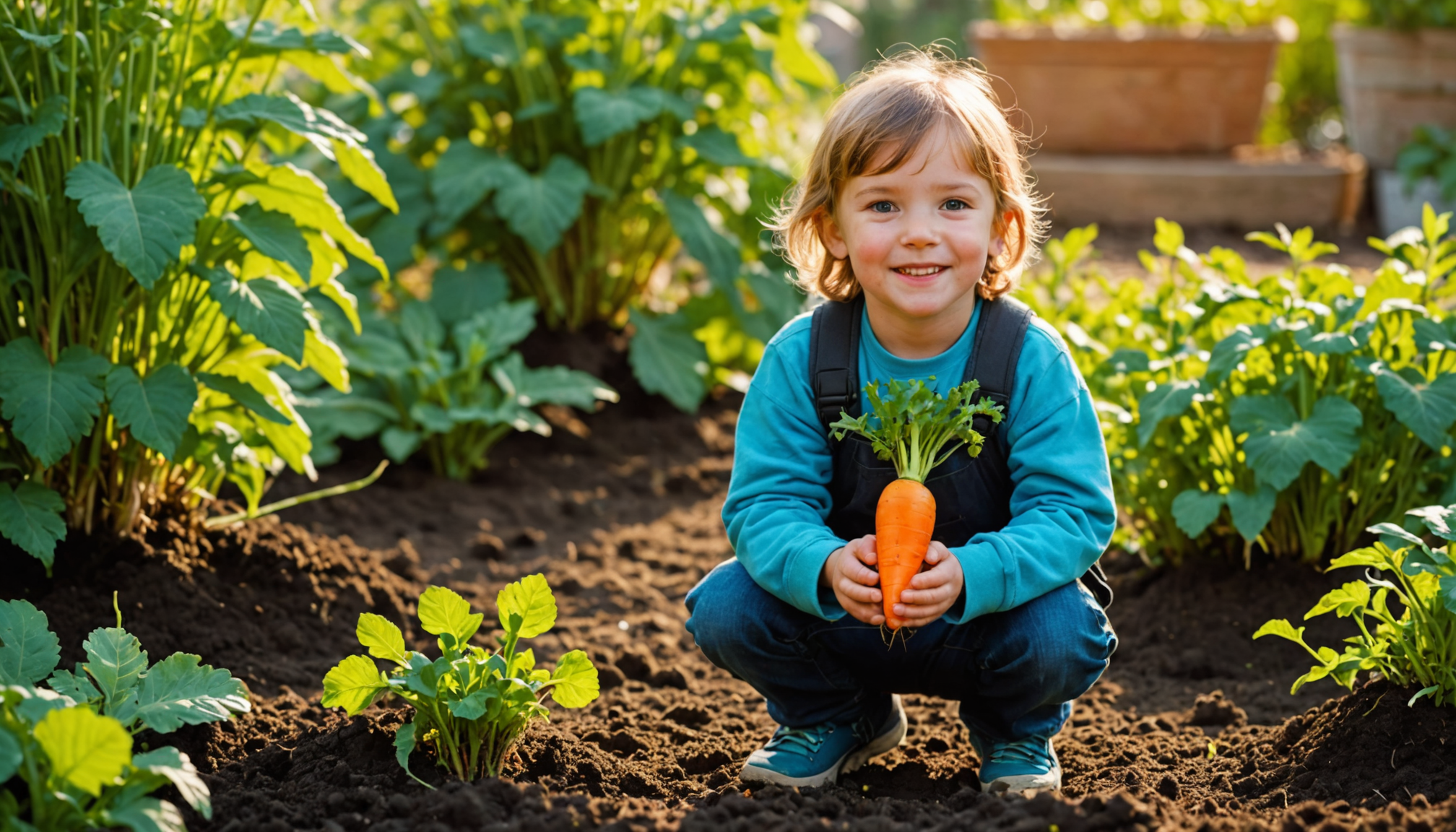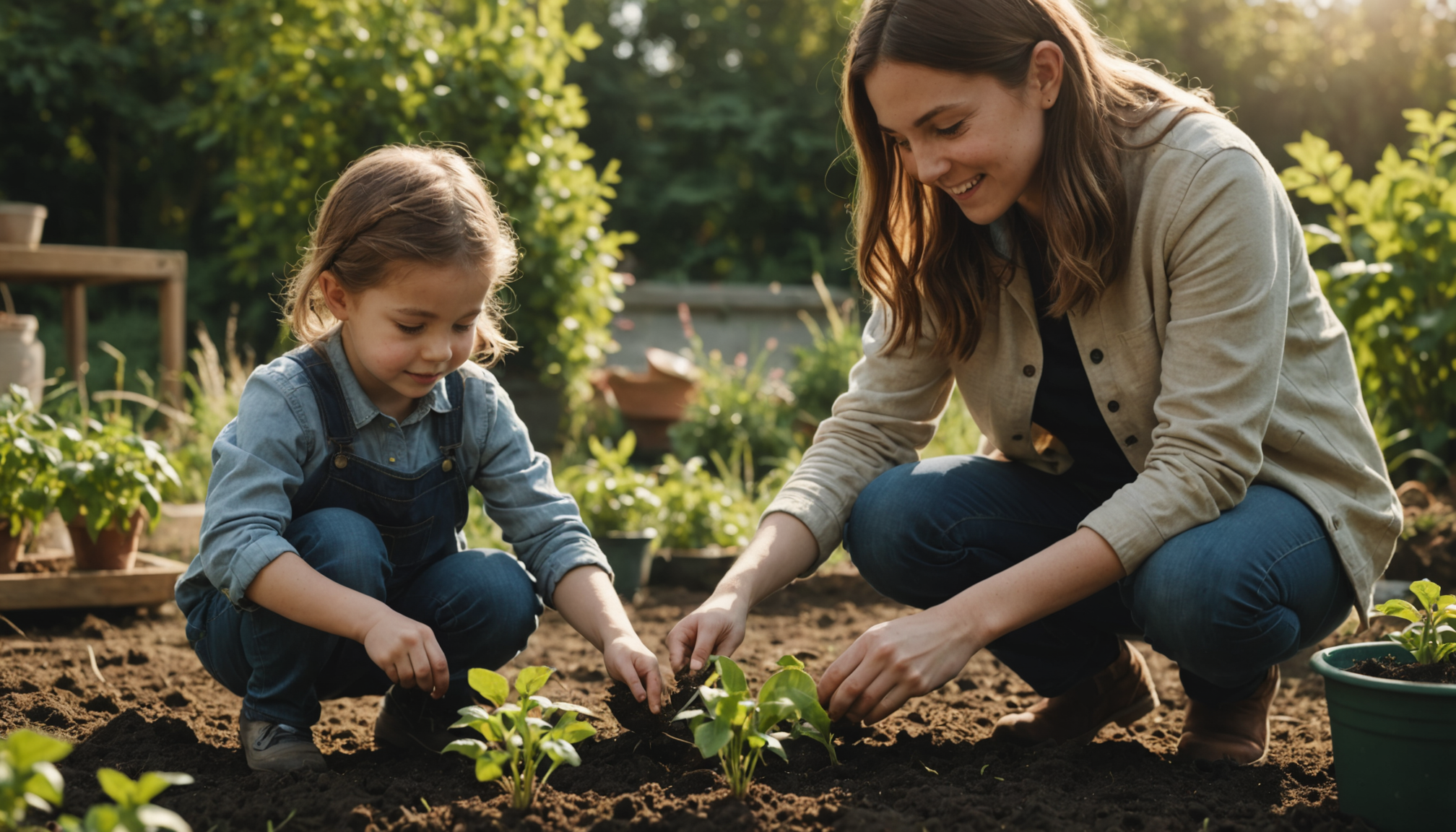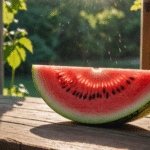- Physical activity and outdoor exercise
- Growing healthy food choices
- Nutritional awareness and education
- Mental health and stress reduction
- Family bonding and social connections
Let’s face it – getting kids to exercise can sometimes feel like trying to herd cats! But family gardening naturally encourages physical activity in a way that doesn’t feel like a workout. When children dig, plant, weed, and water, they’re engaging in moderate to vigorous physical activity without even realizing it.
From squatting to pull weeds to carrying watering cans, these movements build strength, improve flexibility, and enhance motor skills. Your little ones will develop better hand-eye coordination while planting seeds and stronger muscles while turning compost. Plus, the vitamin D boost from spending time in the sunshine supports healthy bone development and immune function.
The health benefits extend beyond just physical exercise. Children who garden regularly often show improved balance, better endurance, and enhanced gross motor skills. Tasks like pushing a wheelbarrow, using garden tools, and reaching for tall plants provide a full-body workout that’s both fun and productive.
Even better, gardening activities can be tailored to different age groups. Toddlers might start with simple watering tasks, while older kids can take on more challenging jobs like building raised beds or turning compost piles. And unlike structured sports or gym classes, gardening allows children to move at their own pace and take breaks when needed.
Remember those countless trips back and forth to the tool shed, the water source, or the compost pile? That’s stealth exercise at its finest! Studies show that children who participate in gardening activities can get up to 60 minutes of physical activity per session – meeting their daily exercise requirements while having fun in the fresh air.
Growing healthy food choices
Creating and maintaining a home garden empowers children to make healthier food choices by connecting them directly with fresh, nutrient-rich produce. When youngsters participate in family gardening, they develop a deeper understanding and appreciation for where their food comes from, making them more likely to try and enjoy fresh vegetables and fruits they’ve grown themselves.
Research shows that children who engage in gardening are 5 times more likely to consume the recommended daily servings of fruits and vegetables. The pride of growing their own food creates a powerful psychological connection that transforms “yucky” vegetables into exciting home-grown treasures.
| Common Garden Vegetables | Growing Difficulty | Time to Harvest | Key Health Benefits |
|---|---|---|---|
| Cherry Tomatoes | Easy | 60-70 days | Vitamin C, Antioxidants |
| Sugar Snap Peas | Easy | 50-70 days | Fiber, Vitamin K |
| Carrots | Moderate | 70-80 days | Vitamin A, Beta-carotene |
| Lettuce | Easy | 30-60 days | Folate, Iron |
The health benefits extend beyond just nutrition. Children learn patience and responsibility while waiting for their crops to grow, and the experience helps them develop a sustainable mindset about food production. Starting with quick-growing vegetables like radishes or lettuce can provide early success and motivation to try more challenging crops.
Family gardening also offers opportunities to experiment with diverse varieties of produce that might not be available in local stores. Purple carrots, striped tomatoes, or rainbow chard can make eating vegetables more exciting and adventurous for young gardeners. This exposure to variety helps develop more sophisticated palates and creates lasting healthy eating habits that can persist into adulthood.
Through hands-on experience, children learn to identify ripe produce, understand seasonality, and develop food preparation skills. They’re more likely to eat what they’ve grown, leading to improved dietary choices and a stronger connection to their food source. This direct involvement in food production often translates into better eating habits and a lifelong appreciation for fresh, wholesome foods.
Nutritional awareness and education

When kids participate in growing their own food, they naturally develop a deeper understanding of nutrition that goes far beyond any classroom lesson. Watching a tiny seed transform into nutritious food creates perfect teaching moments about vitamins, minerals, and the importance of eating a rainbow of fruits and vegetables.
Family gardening opens up countless opportunities to teach children about proper nutrition in a hands-on way. As they tend to their plants, you can explain how different colored vegetables provide various nutrients – like how orange carrots are packed with vitamin A for healthy eyes, or how leafy greens contain iron for strong blood. These natural lessons stick with kids because they’re experiencing them firsthand.
The health benefits extend to the kitchen, where garden harvests become opportunities for cooking lessons. Children who help prepare meals using ingredients they’ve grown show greater interest in trying new foods and understanding balanced nutrition. They learn to identify different plant parts – roots, stems, leaves, fruits – and understand how each contributes to a healthy diet.
Garden-based nutrition education also helps children understand food systems and sustainability. They learn about composting, organic growing methods, and the environmental impact of food choices. This knowledge forms the foundation for lifelong healthy eating habits and environmental awareness.
- Learn to identify different nutrients in various plants
- Understand the connection between soil health and food nutrition
- Discover how weather and growing conditions affect plant growth
- Practice reading seed packets and learning about plant families
- Calculate harvest times and plan seasonal eating
The learning opportunities don’t stop at nutrition. Kids develop math skills by measuring plant spacing and calculating harvest yields. They enhance their scientific understanding by observing plant life cycles and weather patterns. These real-world applications make learning about nutrition and science both meaningful and memorable.
Mental health and stress reduction
“Gardening can be a wonderful way to combat stress, anxiety, and depression in both adults and children. The combination of physical activity, exposure to nature, and the satisfaction of growing something can have profound effects on mental well-being.” – American Horticultural Therapy Association
Research shows that family gardening provides significant mental health benefits for children, offering a natural antidote to modern-day stressors. The gentle rhythm of gardening activities, combined with exposure to fresh air and natural surroundings, helps reduce cortisol levels – the body’s primary stress hormone. Young gardeners often experience improved focus, decreased anxiety, and enhanced emotional regulation.
- Create a dedicated “peace corner” in the garden where children can:
– Practice mindful observation of plants and insects
– Listen to natural sounds like birds and rustling leaves
– Take calming breaks when feeling overwhelmed - Establish simple garden meditation routines:
– Morning plant check-ins
– Quiet watering sessions
– Mindful weeding practice - Implement stress-reducing sensory activities:
– Feeling different soil textures
– Smelling aromatic herbs
– Watching butterflies and beneficial insects
The health benefits of gardening extend to emotional resilience and self-esteem building. When children nurture plants from seed to harvest, they develop a sense of accomplishment and responsibility. This success in the garden translates to increased confidence in other areas of life. Additionally, the garden provides a safe space for processing emotions and practicing mindfulness, helping children develop healthy coping mechanisms for managing stress and anxiety.
Family bonding and social connections
 Working together in the garden creates precious moments of connection between family members that are increasingly rare in our digital age. As parents and children collaborate on garden projects, natural conversations flow more easily, and stories are shared while hands work in the soil. These shared experiences build lasting memories and strengthen family bonds in ways that screen time simply cannot match.
Working together in the garden creates precious moments of connection between family members that are increasingly rare in our digital age. As parents and children collaborate on garden projects, natural conversations flow more easily, and stories are shared while hands work in the soil. These shared experiences build lasting memories and strengthen family bonds in ways that screen time simply cannot match.
The interactive nature of family gardening encourages meaningful communication across generations. Grandparents can pass down traditional growing methods, parents can teach problem-solving skills, and children often surprise everyone with their innovative ideas and fresh perspectives. Each family member finds their unique role, whether it’s the dedicated waterer, the careful seed planter, or the enthusiastic harvester.
Children develop crucial social skills through family gardening activities. They learn cooperation while working on shared tasks, practice patience while waiting for plants to grow, and build empathy by caring for living things. The garden becomes a natural classroom for teaching responsibility, teamwork, and the importance of contributing to family efforts.
Community connections often blossom alongside the plants. Families who garden together frequently share their bounty with neighbors, participate in community garden projects, or join local gardening clubs. Children learn valuable lessons about generosity and community spirit when they can share the literal fruits of their labor with others.
The health benefits extend beyond the immediate family circle. Garden-based activities create opportunities for children to interact with other young gardeners, sharing tips and tricks, swapping seeds, and building friendships rooted in common interests. These social connections contribute to emotional well-being and help children develop strong interpersonal skills that serve them throughout life.
Regular family gardening sessions establish traditions that can be passed down through generations, creating a lasting legacy of environmental stewardship and healthy living. Whether it’s the annual spring planting day or weekly garden maintenance routines, these shared activities become cherished family rituals that strengthen bonds and create lasting memories.


